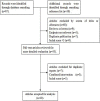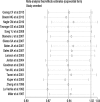Tea consumption and the risk of ovarian cancer: A meta-analysis of epidemiological studies
- PMID: 28445129
- PMCID: PMC5514950
- DOI: 10.18632/oncotarget.16890
Tea consumption and the risk of ovarian cancer: A meta-analysis of epidemiological studies
Abstract
A large number of epidemiological studies have provided conflicting results about the relationship between tea consumption and ovarian cancer. This study aimed to clarify the association between tea consumption and ovarian cancer. A literature search of the MEDICINE, Scopus, PubMed, and Web of Science databases was performed in April 2016. A total of 18 (11 case-control and 7 cohort) studies, representing data for 701,857 female subjects including 8,683 ovarian cancer cases, were included in the meta-analysis. A random-effects meta-analysis was used to compute the pooled relative risks (RR), meta regression, and publication bias, and heterogeneity analyses were performed for the included trials. We found that tea consumption had a significant protective effect against ovarian cancer (relative risk [RR] = 0.86; 95% confidence interval [CI]: 0.76, 0.96). The relationship was confirmed particularly after adjusting for family history of cancer (RR = 0.85; 95% CI: 0.72, 0.97), menopause status (RR = 0.85; 95% CI: 0.72, 0.98), education (RR = 0.82; 95% CI: 0.68, 0.96), BMI (RR = 0.85; 95% CI: 0.70, 1.00) , smoking (RR = 0.83; 95% CI: 0.72, 0.93) and Jadad score of 3 (RR = 0.76; 95% CI: 0.56, 0.95) and 5 (RR = 0.74; 95% CI: 0.59, 0.89). The Begg's and Egger's tests (all P > 0.01) showed no evidence of publication bias. In conclusion, our meta-analysis showed an inverse association between tea consumption and ovarian cancer risk. High quality cohort-clinical trials should be conducted on different tea types and their relationship with ovarian cancer.
Keywords: meta-analysis; ovarian cancer; tea.
Conflict of interest statement
The authors report no conflicts of interests. We confirm that none of the authors are related to authors of studies included in the meta-analysis.
Figures






References
-
- Torre LA, Bray F, Siegel RL, Ferlay J, Lortet-Tieulent J, Jemal A. Global cancer statistics, 2012. CA Cancer J Clin. 2015;65:87–108. - PubMed
-
- Collaborative Group on Epidemiological Studies of Ovarian C. Beral V, Doll R, Hermon C, Peto R, Reeves G. Ovarian cancer and oral contraceptives: collaborative reanalysis of data from 45 epidemiological studies including 23,257 women with ovarian cancer and 87,303 controls. Lancet. 2008;371:303–314. - PubMed
Publication types
MeSH terms
Substances
LinkOut - more resources
Full Text Sources
Other Literature Sources
Medical
Miscellaneous

